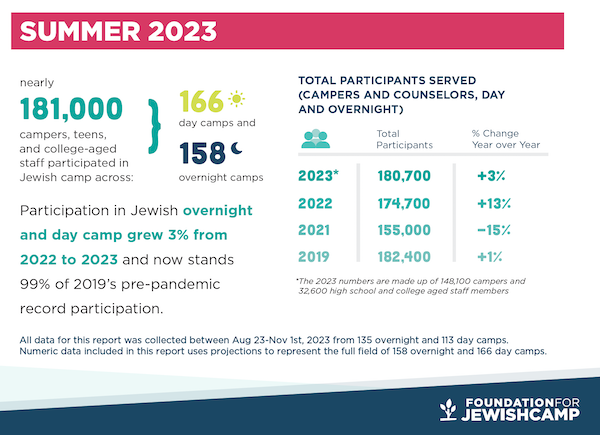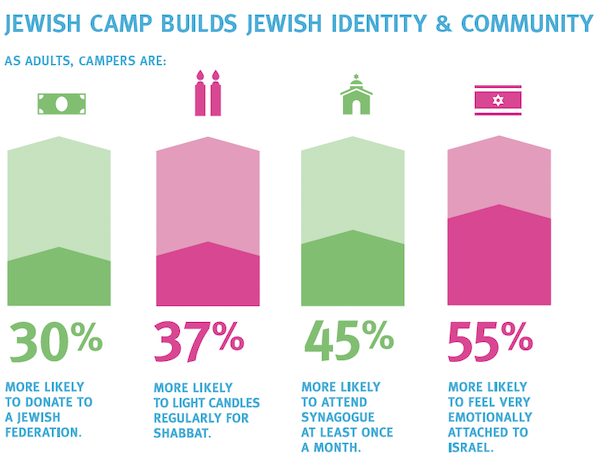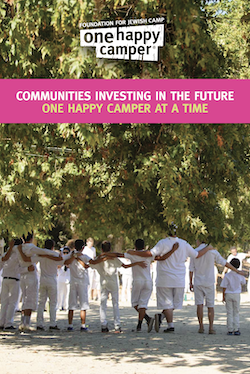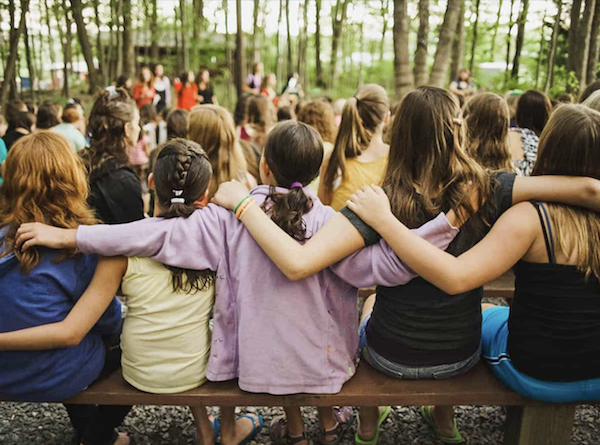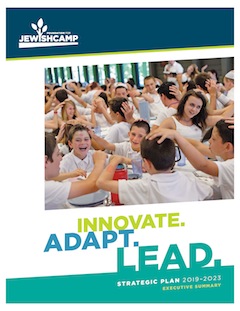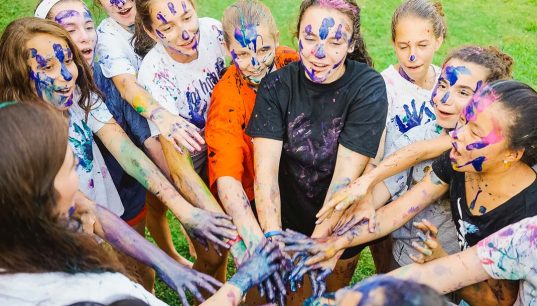The Foundation for Jewish Camp recently released its latest census results, Trends Report: State of Jewish Camp 2023. The research indicates that Jewish camps in Canada and the United States have settled into a new normal within the post-pandemic world.
In summer 2023, the field served 3% (6,000) more campers and counselors than in summer 2022, with a total of nearly 181,000 campers, teens and college-aged staff participating in Jewish camp across 166 day camps and 158 overnight camps. Part of this new reality includes hiring more staff, since fewer are working the full summer. Camps are having to raise more money to keep up with rising costs and the increased demand for camper financial aid.
Some key takeaways from the report are:
• Camp enrolment continues to grow, with the largest gains coming from day camps. Day camps reached pre-pandemic enrolment levels in 2023. Overnight camps enrolment remained at 96% of 2019 (pre-pandemic) levels, but 80% of overnight camps were expecting to increase their enrolment in 2024 – data for last summer are not yet available.
• Many staff are no longer working full summers, which is creating an increased need for seasonal staff positions. The total number of staff in summer 2023 was higher than in 2019 (pre-pandemic) and, given that many staff are not working a full summer, especially within overnight camps, there is a need for camps to hire more staff to fill in gaps.
• Increased turnover of Jewish camp professionals: 66% of reporting overnight camps and 58% of reporting day camps had professional staff leave their positions between fall 2022 and fall 2023.
• Families requested more financial aid from overnight camps than ever before. Overnight camps saw about a 30% increase in the amount of financial aid that families requested from their camps.
• MESSH (mental, emotional, social and spiritual) resources ranked highest in terms of the resources camps need. Camps also indicated a need for resources on character development and resilience-building; parent communication and engagement; antisemitism and bridging differences; and diversity, equity and inclusion. (It should be noted that this census was conducted before the Oct. 7, 2023, Hamas terror attacks on Israel and the ensuing war.)
• Capital needs are a big priority for camps across the field, as camps prioritize growing camper enrolment and making camp more accessible, all while upkeeping older buildings and facilities. Staff housing is a key need, as camps are unable to grow enrolment without it.
Camper satisfaction
Overnight camp overall satisfaction and likelihood to return both increased by 2% in 2023, with levels remaining relatively consistent since 2019, in the 91-94% range for satisfaction and 84-87% range for likelihood to return.
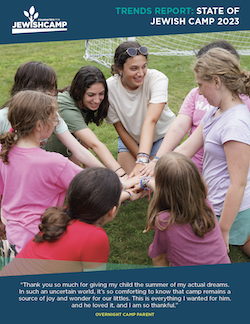 Alongside these trends, positive impacts for Jewish camp remained high, with 93% of families reporting that overnight camp made their child feel part of the larger Jewish community and peoplehood, and 90% of families reporting that camp has built important Jewish friendships for their child.
Alongside these trends, positive impacts for Jewish camp remained high, with 93% of families reporting that overnight camp made their child feel part of the larger Jewish community and peoplehood, and 90% of families reporting that camp has built important Jewish friendships for their child.
In addition, more than half of families reported that their child’s camp experience has motivated their child to participate in other Jewish programming throughout the year.
Regarding day camps, overall camper satisfaction was 87% and the likelihood to return 82% in 2023, levels that have remained relatively consistent since 2021. Further, 82% of families reported that their day camp created a culture of belonging for their child(ren) and 89% of families reported that it is important to them that camp provide an inclusive experience for everyone.
The situation in 2024
An article in the Jerusalem Post last month reported on the Foundation for Jewish Camp’s three-day Jewish camp summit, which took place in Chicago in December. In the article, writer Howard Blas shares some data on the 2024 camp season, which was offered by the foundation’s chief executive officer, Jeremy J. Fingerman.
According to Fingerman, surveys indicated that, in 2024: “Nine in 10 families reported that camp created an environment that supported their children’s social and emotional health and well-being”; “85% of camp staff felt that camp connected them to feeling a part of the worldwide Jewish community”; “94% of parents shared that camp connected their child to the global Jewish community”; and “80% of North American overnight camp staff said camp helped them to connect to Israel and Israeli staff.”
– Courtesy Foundation for Jewish Camp

